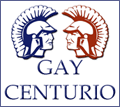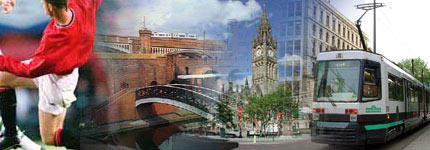|
Manchester Community
Accommodations
Associations
Bars · Cafés · Pubs
Clubs
Escorts
Hair Design
Hotels
Restaurants
Saunas
Services
Shopping
Tourist Information
 Download Maps Download Maps
 Download Movies Download Movies




|


[english] [español] [français] [deutsch] [italiano]
Manchester (city, England),...
...city and metropolitan district, north-western England. It was once a port, connected by the Manchester Ship
Canal (completed 1894) to Eastham on the River Mersey and formerly accessible to ocean-going vessels. It is a
major industrial, cultural, and educational centre. Population 430,800 (1996 estimate).
Educational institutions in the city include the large Victoria University of Manchester (1903), the Royal
Northern College of Music (1923), and Manchester Metropolitan University (1992). A noted cultural centre,
Manchester is the home of the extensive John Rylands Library collection; the renowned Hallé Orchestra (1858);
the Whitworth Art Gallery; and the Manchester City Art Galleries (known for its Pre-Raphaelites collection and
designed by Sir Charles Barry in the 1820s), which incorporate museums of archaeology and natural history, as
well as of science and technology. It is also home to a flourishing musical culture that since the end of the
1970s have included New Order, Take That, Oasis, The Smiths, and The Stone Roses. Manchester United, who play
at Old Trafford, are England's most successful football club in recent years; Manchester City, who play at Maine
Road, Rusholme, are also one of the most enthusiastically supported football clubs. Manchester is the site for the
17th Commonwealth Games in 2002. The city is also the seat of a bishopric of the Anglican Church, and its cathedral
dates from the 15th century. The essayist Thomas De Quincey was born in Manchester, as was the painter L. S. Lowry.
The Roman outpost of Mancunium was established here in the 1st century. The medieval town was probably founded in
the 10th century. Manchester was chartered in 1301, at which time it was developing a wool industry. It was a thriving
commercial town by the 17th century, when the manufacture of cotton textiles was of growing importance. With the
introduction of steam power in cotton milling in 1783, Manchester began a dramatic period of growth. It was connected
by rail with the seaport of Liverpool in 1830.
Manchester was the scene of the Peterloo Massacre (August 1819), when 11 demonstrators, out of a crowd of 60,000
petitioning for repeal of the Corn Laws and for parliamentary reform, were killed in St Peter's Field by a cavalry
charge on the orders of the city authorities. Throughout the 19th century, the citizens of Manchester were notably
active in the liberal-reform movement in politics and in the development of facilities for public education.
The city also became a publishing centre; the Liberal daily newspaper, The Guardian, was founded there in 1821
as the Manchester Guardian.
Declining textile production since the mid-19th century has been partially offset by the introduction of new industries,
of which tourism plays a significant part. The city suffered damage from German bombing during World War II and later
underwent extensive urban rebuilding. On June 15, 1996, the city was the scene of a huge Irish Republican Army bomb
that devastated much of the central shopping area. Manchester's Millennium Quarter includes Exchange Square, opened
in 1999 to commemorate the explosion and its effects; a new City Park; the Cathedral Visitors Centre; and Urbis, a
state-of-the-art exhibition centre, to be completed in 2001. The Lowry—the National Landmark Millennium Projects for
the Arts— opened in 2000.
"Manchester (city, England)," Microsoft® Encarta® Online Encyclopedia 2002
http://encarta.msn.co.uk
© 1997-2002 Microsoft Corporation. All rights reserved.
|
